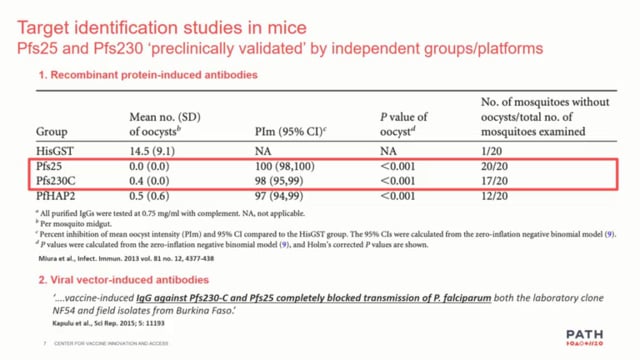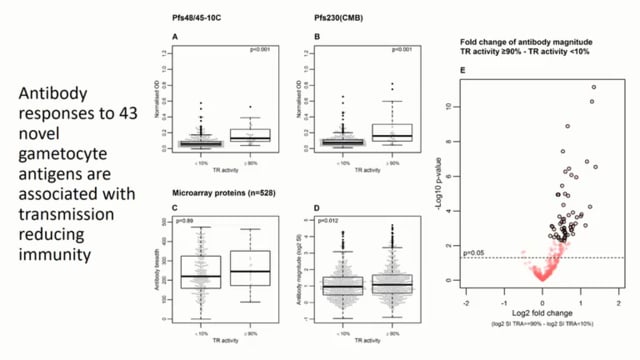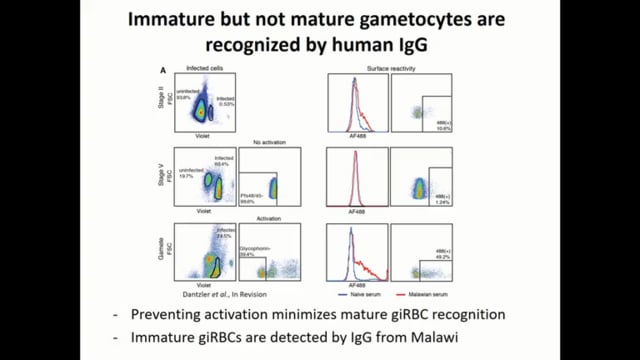Last Updated: 27/05/2025
Innate immune mechanisms governing subclinical malaria in children
Objectives
To investigate the mechanisms underlying subclinical (asymptomatic) malaria caused by Plasmodium falciparum (Pf) infection in school-age children.
Subclinical (asymptomatic) malaria with Plasmodium falciparum (Pf) is common in children who live in moderate- to-high transmission areas of sub-Saharan Africa. Although subclinical malaria may be submicroscopic, affected school-age children (ages 8-15 years) often have positive blood smears that include millions of parasites per mL of blood. While subclinical malaria is typically attributed to acquired adaptive immunity that tightly controls the Pf biomass, patent parasitemia (blood smear+) exceeds any reasonable estimate of the pyrogenic threshold. How is it possible to remain without fever and overt malaria symptoms with patent parasitemia? In contrast to symptomatic malaria, temporally persistent (chronic) subclinical malaria seems to be maintained by a complex balance of pro-inflammatory and anti-inflammatory cytokines and immune cells. The scientific premise of this proposal is that epigenetic modifications of innate immune cells, including blood monocytes (Mo), modulate inflammatory pathways underlying subclinical malaria. Furthermore, we hypothesize that an immune homeostasis network involving anti-inflammatory Pf-induced type 1 T regulatory cells (Tr1) and IL-10 as well as enhanced IL-1RA production suppress innate immune inflammatory pathways. Subclinical malaria is of high epidemiologic significance as parasitemia persists for months in schoolchildren who serve as the major reservoir of gametocytes required to sustain Pf transmission to local anopheline vectors. Indeed, it is estimated that ~ 60% of new mosquito infections can be attributed to this demographic.
To test our hypotheses, we will enroll Kenyan school children (ages 8-15) in a longitudinal cohort study to compare and analyze differences in immune parameters between those with A) chronic subclinical malaria (Pf+ smear at baseline and who remain afebrile despite repeatedly smear+ x 16 weeks) relative to B) children who develop febrile clinical malaria up to 2 weeks after an afebrile Pf+ smear. The specificity of immune parameters for chronic Pf exposure in these cohorts will be interrogated by comparison to age and sex matched children residing in a nearby highlands area where malaria endemicity is ~ zero. PBMC and isolated Mo from children will be analyzed by RNA-seq to determine activated gene expression pathways. We will define the differences in immune cell subsets, the transcription factors that are activated and their effector cytokine expression profiles using mass cytometry (CyTOF). In addition, we will use chromatin immunoprecipitation (ChIP) DNA sequencing to determine if the epigenomes of children with chronic subclinical malaria are modified in order to silence proinflammatory genes or conversely, to activate anti-inflammatory ones. Finally, we will identify and compare by Assay for Transposase-Accessible Chromatin with high-throughput Sequencing (ATAC-seq) open chromatin sites in key gene expression pathways in Mo from the comparator groups and align these regions with RNA-seq data from the same child. The successful completion of this project should give us new and important insights as to the mechanism of subclinical malaria and how this disease state can be modified to facilitate malaria eradication.
Sep 2022 — Aug 2026
$737,656


